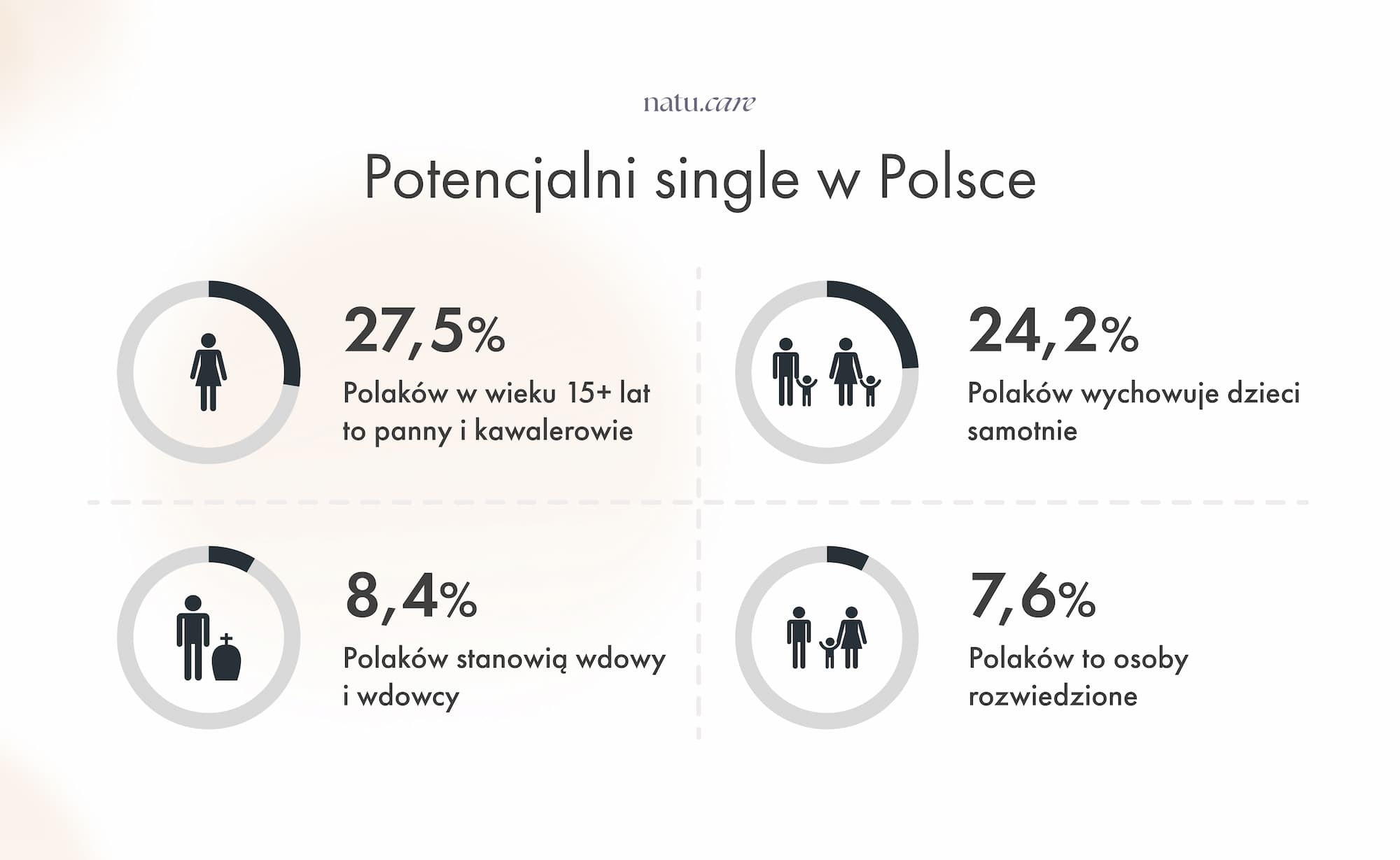You don't have to have a couple to feel loved. Singles on Valentine's Day
How many Poles are single and why have they chosen to live alone?


Learn more about our editorial process
.

Learn more about our editorial process
.

Learn more about our editorial process
.

Learn more about our editorial process
.
Why you can trust us
Articles on Natu.Care are written based on scientific research, data from government websites and other reliable sources. The texts are written in cooperation with doctors, nutritionists and other health and beauty experts. Articles are reviewed before publication and during significant updates.
.Learn more about our editorial process
.Information about advertisements
Content on Natu.Care may contain links to products from the sale of which we may receive a commission. When creating content, we adhere to high editorial standards and take care to be objective about the products discussed. The presence of affiliate links is not dictated by our partners, and we select the products we review ourselves completely independently.
.Learn more about our terms and Conditions
.Love is the most important thing. But sometimes it is better to put the one for oneself above the affection we bestow on others. That's what singles do.
Valentine's Day is for some a sign of capitalism, for others obciach and cheesy, and for still others a cool opportunity to show their affection. And on this occasion, I decided to take a look at a social group that, on 14 February, can feel a bit forgotten.
Are they rightly so? Not necessarily.
Since I've been single, I find more time to get to know myself and my needs - to love myself..
Zosia36 years old, single for a year
From this article you will learn:
.- Is it known how many singles live in Poland. .
- Who most often lives alone.
- Why do people stay single?
- Why people become singles.
- Why people become singles.
- Does every single person feel lonely. .
- How to live well with yourself. .
See also:
.- Hug Day
- How to take care of your mental health
- World No Mobile Phone Day
- Bone Marrow Donor Day
- Blood Donation and Blood Donation Day
- Clean Air Day
- Food waste
- World No Smoking Day .
- World Cancer Day
- Lungs after a pandemic
- Thyroid Disease Awareness Month
- Bee Day
- Fish Day
Who is a singleton?
.The PWN Dictionary of the Polish Language defines the term single as "a person who is lonely, living alone"and. However, it seems that this description is no longer valid or sufficient.
Well, does every single person have to be single and, is a parent living with a child but raising them alone not single?"
.Today, experts tend to treat the concept of single as broadly as possible. Young adults, middle-aged, divorced and widowed are all included in this group. It is safest, therefore, to consider that single, is simply someone who is not in a stable romantic relationship.
Single statistics
.Since it is known who singles are, it would be good to know how many people in Poland have this status. And this is where the stairs begin. Why? Because no reliable and up-to-date data directly relates to the actual number of singles.
According to the 2021 National Population and Housing Census, 8,826,147 (27.5%) Poles aged 15 and over have a marital status of 'single' or 'single'and. However, it cannot be said that this is how many singles we have in Poland - some of them may be living in informal relationships. This is especially true for minors, but not only.
The same is true for widowed and divorced people, of whom we have a total of 5 132 532 in Poland, i.e. 16% of the population. Some of these people may no longer want to change their marital status again and at the same time have a new partner. 8.4% of people admit to living in informal relationshipsand.
Interestingly, single people are a large group in Poland - as many as 24.2% of the population. This statistic, by the way, seems most telling, as it separated those raising children in informal relationships from this group . Again, however, taking this result as "the number of singles in Poland" would be a major overinterpretation.

The above data can, however, provide a starting point and give some insight into the structure of Polish society. It is also interesting to compare some indicators with those of 2011. In 2021, the percentage of maids and bachelors decreased by 1.3% compared to 2011. Similarly, today we have slightly fewer widows and widowers than a dozen years ago - by 1% to be exact. On the other hand, there is an increase in the number of divorced people: from 5% in 2011 to 7.6% in 2021.
.Who is a contemporary single?
.According to dating website Meetic's 2023 report 'On the trail of partnership' the statistical single is a person with a secondary or tertiary education and a financial situation ranging from average to very goodand.
Additionally, only 35% of those surveyed are looking for a permanent partner, with men leading the way. According to the above report, 42% of single men and 32% of female singles are thinking about getting marriedand.
It is worth mentioning here that the above study was based on a survey group of singles aged 30-60.
.The profile of the modern single is changing. Increasingly, single people are looking for a partner to spend time together - doing hobbies, developing passions, travelling, and not necessarily to live together. Today's singles are also aware of their needs, and see a relationship as a complement to achievements in other fieldsand.
Natu.Care Collagen Premium 5000 mg, mango & passion fruit

- Collagen content: 5000 mg marine collagen hydrolysate
- Additional active ingredients: vitamin C, low molecular weight hyaluronic acid (and L-theanine and coenzyme Q10 in cocoa flavoured collagen or vitamin A and vitamin E in mango–passion fruit flavoured collagen)
- Form: powder sachets
- Dose: 1 sachet per day
- Sufficient for: 30 days
Product description
Fish collagen from the Natu.Care brand in a dose of 5000 mg, based on certified ingredients of the best quality. Regular supplementation will positively influence the appearance of the skinóry, hairów and nails – they will be rebuilt and strengthened from the inside.
In addition to collagen, which is valuable for health and beauty, it also offers other active ingredients that help to maintain a youthful complexion, shiny hair and strong nails.
The formula contains a sufficient portion of the active ingredient to positively affect joints, the musculoskeletal system and immunity.
Natu.Care Premium Collagen is available in two flavours – Cacao Bloom and Rise&Shine. Both formulas are based on the following active ingredients: marine collagen hydrolysate, wild roseóbud extract and hyaluronic acid.
Additionally, Cacao Bloom contains natural L-theanine, coenzyme Q10 and defatted Dutch cacao. Rise&Shine instead contains vitamin E and vitamin A.
These are the best collagens in the world.
These best fish collagens on the market also rós taste – Cacao Bloom is a treat for chocolate lovers. Rise&Shine will appeal to those whoólike the refreshing taste of mangoófruit and passion fruit.
Pros and cons
Pros:
- Vitamin C supports the body's collagen production, enhancing its effectiveness.
- An effective dose of hyaluronic acid, which additionally supports skin hydration and joint health.
- Fish collagen absorbs 50% better. Additionally, the manufacturer specifies the fish species it is sourced from (Atlantic cod).
- The composition has been tested by the independent and accredited J.S. Hamilton laboratory.
- MSC (Marine Stewardship Council) quality certification, which confirms that the collagen source supports sustainable fishing practices.
Cons:
- None.
Additional information
Natu.Care's fish collagen receives praise for its delicious taste. You won't find the fishy aftertaste that often comes through in other collagens. Plus, you have two tasty flavors to choose from: cocoa and mango-passionfruit.
Active ingredients like coenzyme Q10, hyaluronic acid, and natural L-theanine provide anti-inflammatory and antioxidant benefits while slowing down aging processes.
User review
Super, after about 6 weeks of use, the skin on my face became noticeably firmer. Wonderful taste.
Ania ZalewskaNatu.Care customer
Natu.Care Premium collagen 10 000 mg, mango-maracuja

- Collagen content: 10,000 mg marine collagen hydrolysate
- Additional active ingredients: vitamin C, low molecular weight hyaluronic acid (and L-theanine and coenzyme Q10 in cocoa flavoured collagen or vitamin A and vitamin E in mango–passion fruit flavoured collagen)
- Form: powder sachets
- Dose: 1 sachet per day
- Sufficient for: 30 days
Product description
One of the strongest collagens on the market, whichós provides as much as 10,000 mg in a daily serving. This allows the formula to effectively support the condition of the skin, hair and nails.
With this supplement, you will support your beauty, which will allow you to visually stop the ageing process and feel a second youth!
Natu.Care Collagen Premium 10 000 mg comes in two flavours – cherry and mango-maracuja. Both formulas have the same product backbone – collagen, hyaluronic acid and vitamin C.
In the cherry version you additionally find glucosamine, chondroitin and Indian frankincense resin extract. Mango-maracuja, on the other hand, contains vitamin E and vitamin A.
Pros and cons
Pros:
- Tested collagen formula – SeaGarden, whose effects have been confirmed in clinical studies.
- Effective dose of hyaluronic acid, additionally moisturizing the skin and positively impacting joint health.
- Vitamin C supports the body’s natural collagen production.
- The composition has been tested by the independent and accredited J.S. Hamilton laboratory.
- The product has an MSC (Marine Stewardship Council) quality certification – the collagen source supports sustainable fishing practices.
Cons:
- None.
Additional information
Users praise Natu.Care Collagen Premium for the easy dissolvability of the powder.
User review
I noticed a significant improvement in my skin texture after a few weeks of taking collagen regularly. My complexion is now as soft as velvet!
Natu.Care Collagen Premium 10000 mg, cherry

- Collagen content: 10,000 mg of hydrolyzed bovine collagen
- Additional active ingredients: vitamin C, low molecular weight hyaluronic acid, glucosamine, chondroitin, extract of Indian frankincense resin (boswellia serrata)
- Form: powder sachets for drinking
- Serving: 1 sachet per day
- Lasts for: 30 days
Product description
One of the strongest collagens on the market, providing as much as 10,000 mg per daily serving. This product can effectively support the condition of joints, skin, hair, and nails.
With this supplement, you will support your skeletal and joint system as well as your beauty, helping you visually halt the aging process and feel rejuvenated!
Pros and cons
Pros:
- The daily portion of collagen is very large – as much as 10,000 mg.
- Proven collagen formula – COLLinstant, whose effectiveness has been confirmed in clinical studies.
- Effective dose of hyaluronic acid, which additionally moisturizes the skin and positively affects joint health.
- Vitamin C supports the body's natural collagen production.
- Glucosamine is a fundamental building block of compounds found in joint cartilage and a component of collagen that gives elasticity to connective tissue in tendons.
- Chondroitin is a natural component found in the human body, mainly in cartilage. This large molecule (mucopolysaccharide) has the ability to absorb water, which helps maintain the elasticity and resilience of cartilage.
- Frankincense resin extract supports blood circulation and joint mobility and reduces their stiffness. It may help alleviate inflammatory conditions.
- The composition has been tested by the independent and accredited J.S. Hamilton laboratory.
Cons:
- None.
Additional information
Users praise Natu.Care Collagen Premium for the easy dissolving of the powder.
Premium Sodium Butyrate
Product description
Premium Sodium Butyrate is a natural support for your digestive system. With a high dose of butyric acid (940 mg), it supports the regeneration of the intestinal mucosa, improving gut health and function, and aids in the absorption of nutrients. By taking care of your intestines, you're taking care of the health of your entire body.
Studies involving people suffering from irritable bowel syndrome confirm that sodium butyrate is ideal for supporting issues related to bacterial flora imbalances (for example, after antibiotic therapy), constipation and diarrhea, inflammation of the intestinal mucosa, or a diet low in fiber.
Premium Sodium Butyrate capsules are made using the innovative DRcaps® technology. This guarantees that the active ingredients in the product are protected from the destructive effects of stomach acids and digestive enzymes. As a result, we can be sure that the beneficial ingredients are released in the small intestine and are fully absorbed by our body.
Premium Sodium Butyrate from Natu Care is 100% tested, and its composition contains only the highest quality raw materials.
Pros and cons
Pros:
- Supports digestive system function
- Helpful for various gastrointestinal conditions, including IBS
- High dose of butyric acid in each capsule
- Eco-friendly, clean, and tested composition
- Free from added sugar, gluten, GMOs, and lactose
- Innovative capsule technology - DRcaps
Cons:
- None
Additional Information
Take 3 capsules daily at any time of the day, preferably with a meal. Swallow the capsules whole with water.
Premium Sodium Butyrate is intended for adults.
The product should be used under medical supervision.
User review
I've been using the product for 2 weeks. My stomach feels lighter, and my digestion has improved. I recommend it.
Natu.Care Premium Magnesium + Vitamin B6

- Magnesium content per day: 305 mg
- Additional active ingredients: Vitamin B6 (2.1 mg)
- Form: capsules
- Serving size: 3 capsules per day
- Sufficient for: 30 days
Product description
The Premium Magnesium + Vitamin B6 dietary supplement is a comprehensive product that combines three organic forms of magnesium (citrate, malate, and diglycinate) and vitamin B6 in highly absorbable forms.
Magnesium is an essential mineral without which our bodies cannot function properly. It supports the immune, nervous, and muscular systems, maintains electrolyte balance, and is involved in cell division and the regulation of mental functions.
Research shows that magnesium supplementation is even more effective when accompanied by vitamin B6, which is included in our product. Vitamin B6 is responsible for the proper functioning of the nervous and immune systems, as well as the proper functioning of the heart.
If you want to safely get rid of feelings of fatigue, concentration problems, hair loss, muscle cramps, trembling, or irritability, reach for Premium Magnesium from Natu.Care, tested by the independent, certified laboratory J.S. Hamilton Poland.
Pros and cons
Pros
- Supports the proper functioning of the nervous and immune systems.
- Reduces feelings of fatigue and tiredness.
- Maintains proper psychological functions.
- The purity of the ingredients (free from anti-caking agents, artificial fillers, and additives such as titanium dioxide, microcrystalline cellulose, talc, magnesium stearate, and silicon dioxide) has been confirmed by laboratory tests.
- High absorption of ingredients.
- Soft capsules that are easy to swallow.
- Suitable for vegetarians and vegans.
Cons
- None.
Additional information
Take with a meal, 3 capsules per day.
The capsules should be taken with at least 250 ml of water.
If you have trouble sleeping, it is advisable to take 1 capsule in the morning and 2 capsules in the evening, no later than 4 hours before bedtime.
Avoid combining with products high in calcium (milk, yogurt, cheese), as this may negatively affect magnesium absorption.
Pregnant and breastfeeding women should consult a doctor before starting supplementation.
User review
I’m very impressed with the speed of delivery. The product itself is of high quality and absorbs well. After two weeks of supplementation, I’ve noticed a significant improvement in muscle recovery, especially during periods of intense training. I highly recommend it!
Product description
The dietary supplement contains omega-3ᵀᴳ, or omega-3 acids in the form of trójglyceridesów. Scientific studies suggest that this form of fatty acidsós up to 2 times better absorbed than the estersós present in many dietary supplements on the market. This means that you are assured of their effectiveness and of supplying yourself with valuable omega acids.
Fatty acids omega-3 are derived from wild anchovy oil. It is a rich source of healthy fats that are essential for the health of the cardiovascular, immune and nervous systems, as well as the proper function of vision, joints muscles.
Scientific research suggests that wild anchovies are a good source of healthy fats.
Scientific research also suggests that an adequate intake of omega-3 fatty acidsós protects against and supports the treatment of depression and anxiety disorders. In addition, omega-3s influence the hydration and appearance of the skinóry and support healthy sleep.
.
The formula contains a total of 750 mg of EPA+DHA acidsós, which is three times higher than the recommended minimum of 250 mg for the Polish population. Omega-3 TG Premium has studies indicating that its TOTOX is 9, which is a very good result.
Supplementation of omega-3 fatty acidsóis recommended for anyone who does not eat 1–2 portions (approximately 300 g) of oily fish per week. Children during growth, seniors, physically active people, vegans and vegetarians, as well as patients undergoing cardiovascular treatment and prevention of heart disease also have an increased need.
Pros and cons
The dietary supplement contains omega-3ᵀᴳ, or omega-3 acids in the form of trójglyceridesów. Scientific studies suggest that this form of fatty acidsós up to 2 times better absorbed than the estersós present in many dietary supplements on the market. This means that you are assured of their effectiveness and of supplying yourself with valuable omega acids.
Fatty acids omega-3 are derived from wild anchovy oil. It is a rich source of healthy fats that are essential for the health of the cardiovascular, immune and nervous systems, as well as the proper function of vision, joints muscles.
Scientific research suggests that wild anchovies are a good source of healthy fats.
Scientific research also suggests that an adequate intake of omega-3 fatty acidsós protects against and supports the treatment of depression and anxiety disorders. In addition, omega-3s influence the hydration and appearance of the skinóry and support healthy sleep.
.
The formula contains a total of 750 mg of EPA+DHA acidsós, which is three times higher than the recommended minimum of 250 mg for the Polish population. Omega-3 TG Premium has studies indicating that its TOTOX is 9, which is a very good result.
Supplementation of omega-3 fatty acidsóis recommended for anyone who does not eat 1–2 portions (approximately 300 g) of oily fish per week. Children during growth, seniors, physically active people, vegans and vegetarians, as well as patients undergoing cardiovascular treatment and prevention of heart disease also have an increased need.
Additional information
The dietary supplement contains omega-3ᵀᴳ, or omega-3 acids in the form of trójglyceridesów. Scientific studies suggest that this form of fatty acidsós up to 2 times better absorbed than the estersós present in many dietary supplements on the market. This means that you are assured of their effectiveness and of supplying yourself with valuable omega acids.
Fatty acids omega-3 are derived from wild anchovy oil. It is a rich source of healthy fats that are essential for the health of the cardiovascular, immune and nervous systems, as well as the proper function of vision, joints muscles.
Scientific research suggests that wild anchovies are a good source of healthy fats.
Scientific research also suggests that an adequate intake of omega-3 fatty acidsós protects against and supports the treatment of depression and anxiety disorders. In addition, omega-3s influence the hydration and appearance of the skinóry and support healthy sleep.
.
The formula contains a total of 750 mg of EPA+DHA acidsós, which is three times higher than the recommended minimum of 250 mg for the Polish population. Omega-3 TG Premium has studies indicating that its TOTOX is 9, which is a very good result.
Supplementation of omega-3 fatty acidsóis recommended for anyone who does not eat 1–2 portions (approximately 300 g) of oily fish per week. Children during growth, seniors, physically active people, vegans and vegetarians, as well as patients undergoing cardiovascular treatment and prevention of heart disease also have an increased need.
Expert opinion
The dietary supplement contains omega-3ᵀᴳ, or omega-3 acids in the form of trójglyceridesów. Scientific studies suggest that this form of fatty acidsós up to 2 times better absorbed than the estersós present in many dietary supplements on the market. This means that you are assured of their effectiveness and of supplying yourself with valuable omega acids.
Fatty acids omega-3 are derived from wild anchovy oil. It is a rich source of healthy fats that are essential for the health of the cardiovascular, immune and nervous systems, as well as the proper function of vision, joints muscles.
Scientific research suggests that wild anchovies are a good source of healthy fats.
Scientific research also suggests that an adequate intake of omega-3 fatty acidsós protects against and supports the treatment of depression and anxiety disorders. In addition, omega-3s influence the hydration and appearance of the skinóry and support healthy sleep.
.
The formula contains a total of 750 mg of EPA+DHA acidsós, which is three times higher than the recommended minimum of 250 mg for the Polish population. Omega-3 TG Premium has studies indicating that its TOTOX is 9, which is a very good result.
Supplementation of omega-3 fatty acidsóis recommended for anyone who does not eat 1–2 portions (approximately 300 g) of oily fish per week. Children during growth, seniors, physically active people, vegans and vegetarians, as well as patients undergoing cardiovascular treatment and prevention of heart disease also have an increased need.
Natu.Care Vitamin D 2000 UI
Product description
Vitamin D plays a crucial role in our health and well-being. It affects calcium and phosphate metabolism, which translates to healthy bones and teeth. It also helps regulate the immune system, and studies indicate its influence on the functioning of the nervous system.
Vitamin D, although called a “vitamin,” is actually a prohormone that our body produces on its own, primarily under the influence of sunlight. Unfortunately, our modern lifestyle contributes to deficiencies of this essential vitamin. Working in enclosed office buildings, using (necessary!) SPF creams, and covering the body with clothing all make it very difficult, if not impossible, to obtain adequate levels of vitamin D from sunlight. This is why appropriate, year-round supplementation is so crucial.
Vitamin D from Natu.Care is a well-tested vitamin D3 suspended in safflower oil, a plant known for its numerous health benefits. The convenient, easy-to-swallow capsule will make supplementation a part of your daily, healthy routine, improving your overall well-being.
Pros and cons
Pros:
- Ensures proper functioning of the immune system
- Supports the maintenance of healthy bones and teeth
- Maintains proper heart, kidney, and muscle function
- Tested by an independent, certified laboratory
- Convenient and easy-to-swallow capsule
- Clean composition - free from added sugar, gluten, GMOs, lactose, and without preservatives or colorants
Cons:
- None.
Additional Information
Pregnant women and breastfeeding mothers should consult a doctor before using the product. This dietary supplement is intended for a healthy adult population up to the age of 75.
Collagen Booster - Glow Stories

- Active ingredients: bamboo shoot extract, Quatrefolic®, L-Methionine, L-cysteine, vitamin E, vitamin A, niacin (vitamin B3), vitamin B6, vitamin B2 (riboflavin), biotin, zinc, copper
- .
- Form: capsules
- .
- Dose: 1 capsule per day
- .
- Sufficient for: 60 days
- .
Product description
A dietary supplement containing vitamins, minerals and plant extracts thatósupport the skinóhand, hair and nails. The product is especially distinguished by the form of folate – it is Quatrefolic, whichós absorbed very well and is natural.
In addition to valuable vitamins and minerals, such as vitamin A, E, B3, B2 and biotin, the formula contains bamboo shoot extract, whichóry further enhances your beauty.
Pros and cons
A dietary supplement containing vitamins, minerals and plant extracts thatósupport the skinóhand, hair and nails. The product is especially distinguished by the form of folate – it is Quatrefolic, whichós absorbed very well and is natural.
In addition to valuable vitamins and minerals, such as vitamin A, E, B3, B2 and biotin, the formula contains bamboo shoot extract, whichóry further enhances your beauty.
Additional information
A dietary supplement containing vitamins, minerals and plant extracts thatósupport the skinóhand, hair and nails. The product is especially distinguished by the form of folate – it is Quatrefolic, whichós absorbed very well and is natural.
In addition to valuable vitamins and minerals, such as vitamin A, E, B3, B2 and biotin, the formula contains bamboo shoot extract, whichóry further enhances your beauty.
Single by choice or necessity?
.Despite the fact that the question: how many singles are there in Poland? is difficult to give a precise answer, we can with high probability assume that there are quite a lot of them. Why do many people choose to live alone and... is it really their choice?"
.According to the Meetic report, around 65% of singles do not want to tie themselves down to anyone permanently at alland. Even if they are looking for a companion, it's on a non-committal basis. What could be the reason for this?
I do what I want and I don't have to look at anyone. To be honest, I can't imagine a situation where someone would have to check my expenses or decide how I spend my weekend..
Ewelina25 years old, never been in a steady relationship
The reasons for the lack of a life partner are attributed by experts to:
.- .
- prioritising the importance of freedom and independence over the need to build a relationship, .
- previous love disappointments, .
- overly detailed and exorbitant requirements for a partner, .
- hypocritical experiences from the family home, .
- negative ideas about love and imposed social roles, .
After several failed relationships, I have come to the conclusion that I am more comfortable with myself than maintaining a complicated relationship for the sake of it. I don't close myself off from relationships, but now I put myself first..
Zosia36 years old, single for a year
What about the group that is single despite wanting to find someone? In these cases, the reasons may (though not necessarily) be quite different. Finding your other half can be difficult:
- shyness, which blocks making new relationships, .
- being around the same group of people for many years, .
- low self-esteem and complexes, .
- confidence problems (e.g. after a previous betrayal), .
- lack of social skills, .
After university and the first few years of work, everyone was already paired up. I was the only one who somehow stayed that way. I didn't want to be alone, but I realised I didn't really have much of a place to meet someone new. When the opportunity came for me to change jobs and move to another city, I took it. It paid off. I met a great girl..
Matthew42 years old
Social and material hardship may also come into play - something that is not usually mentioned. Unfortunately, the reality is quite brutal. For example, a single parent will find it much harder to find a partner. For the patchwork family model is not very popular in Poland, although this is fortunately slowly changing.
.I became a widow when my son was eight years old. Of course I tried to find someone later on, but I heard a lot about "raising other people's children"... So much so that now that my son is an adult, I have no intention of getting involved with anyone anymore..
Kinga47 years old, single for 13 years
Does single equal single?
In the virtual space, the words single and single are often used interchangeably. Is this right? Those involved themselves, indicate that not necessarily.
A question of proximity and support? These gaps are filled for me by my family and friends. I am alone, but I don't feel lonely..
Zosia36 years old, single for a year
Modern singles very often value contact with their family members and have extended groups of friends and acquaintances with whom they spend their free time. They also realise that close relationships with others are an important part of human well-being.
I plan all holidays and important dates with my loved ones. Holidays, instead of with one partner, I spend with a group of great friends. Since I've been single, I've deepened relationships with my sister and friends from years ago. These new bonds have brought a lot of good into my life..
Basia34 years old, single for 4 years
There is, however, no shortage of people for whom the lack of a permanent partner is a serious problem.
I have friends. So what if they each have their own family and they put it first. Since my mates have kids, it's hard to get together at all. Anyway, that can never replace the kind of closeness you have in a relationship..
Damian37 years old, single for 9 years
During the interviews with singles I conducted for this article, I asked about another issue. About the question of the further future - the prospect of old age. Already, seniors are the most lonely social group in Polandand.
Some of my interlocutors just shrug their shoulders, some dismiss me with a joke (And who knows if I'll live to see it?). Others admit outright that they are afraid of old age and see it in black colours. However, there are also those who have a concrete plan:
.We in our pack have made an agreement like this: if we are going to be alone in old age - we sell our flats, buy a big house together and live together, in a kind of communion.
.. .Basia34 years old, single for 4 years
Living alone and the impact on health
.According to research by John T. Cacioppo and William Patrick, loneliness can be as detrimental to health as obesity and smokingand. Lack of physical contact with another person has a direct impact on your wellbeing and health.
Deficit of closeness, for example, can be associated with higher levels of cortisol in the body, and this translates into feelings of anxiety, problems concentrating or insomnia. Single people are also much more likely to suffer from depressionand.
.Are singles therefore doomed to a shorter and less comfortable life? As the quotes from earlier in the article show - no. Proximity and heartfelt physical contact is not exclusive to romantic relationships. There are similar effects from hugging friends, close relationships with other family members and even contact with animalsand.
It doesn't matter if you're in a steady relationship - it's important not to close yourself off to other people.
.In a relationship with yourself...
.Whether you're actively looking for your other half or being single is a state in which you feel like a fish in water, it's worth taking care of not only your relationships with others, but also with yourself every day. Loving yourself is often the first step to building valuable relationships with others.
What can you do to feel good about your thoughts and feelings?
.Self-acceptance
.Start with a regular practice of self-acceptance and positive thinking. Every morning, write down at least three things you are grateful for in your life. This will help you to focus on the positive aspects of your life and strengthen your self-love.
Treat yourself in a positive way.
Treat yourself as you would a friend. Let your inner voice not be your biggest critic, but your supportive soulmate. Not sure how to do this? A simple example: The next time you spill your tea, instead of thinking "I'm so clumsy", think about what you would say to someone close to you in that situation. It would probably be something like: "Don't worry. It happens to everyone".
.Care for your needs
.Think about your emotional needs as well as your physical needs and take care of them. Express your feelings in a healthy way by seeking support from loved ones or therapy. Keeping a diary of your emotions can also be helpful. Take care of your body by exercising regularly and eating a healthy diet. Remember that taking care of yourself is crucial to your self-esteem.
Gratitude for yourself is also important. Every evening, think about what you are grateful to yourself for today and why. It doesn't have to be spectacular things - or even the smallest things that we don't pay attention to, such as taking a 15-minute nap during the day so you had more energy..
 .
.
Jagoda TurowskaPsychologist and social skills trainer
Assertiveness
.Set healthy boundaries and nurture friendly relationships with others. Say "no" to situations that put you over the edge and learn assertiveness to express your needs. Avoid toxic relationships and surround yourself with people who support and inspire you.
Exploring yourself
.Find passions and interests that fascinate you and make you feel fulfilled. Invest time in developing them. There are many options to choose from, such as painting, playing an instrument or reading. This will help you discover your individuality and strengthen your self-love.
Remember that working on your relationship with yourself is a process that takes time and consistency. However, taking small steps every day can lead to big changes in your life. So, start now and enjoy the benefits of strengthening your self-love.
Summary
.- Single is a person who is not in a stable romantic relationship.
- Single is a person who is not in a stable romantic relationship.
- As many as 43.5% of the Polish population are not in formalised relationships. This group includes maids, bachelors, widowers and divorced people.
- The following are some of the reasons for this.
- As many as 8.4% of Poles admit to living in non-formalised relationships. .
- The average single is a well-educated person with a good income. .
- Some people remain single due to their convenience or excessive demands, others have problems finding a partner e.g. through shyness. .
- Not all singles feel lonely. Many of the single people have close relationships with their friends and families.
- Self-acceptance and the ability to take care of one's own needs are also needed to maintain mental wellbeing. .
FAQ
.What age are the most singles?
.Most singles are between the ages of 18 and 34. To find a partner for yourself, focus on places and events that attract your age group. For example, you could try using dating apps, attending singles events or joining interest clubs.
What does it mean to be single?
.Being single means being a person who does not currently have a steady romantic partner. Remember that being single is a time that you can use to develop yourself, meet new people and enjoy life.
What does loneliness manifest itself as?
.You can recognise loneliness by its symptoms: feelings of isolation, lack of close relationships, sadness, decreased energy. Engaging in new initiatives can help you combat loneliness. Find a hobby or interest group, such as a book club, where you will meet like-minded people.
If you are having trouble forming relationships, go to a professional for help. Therapy can be key in helping you learn to build healthy relationships with others.
Therapy can be the key to learning to build healthy relationships with others.
Where is the easiest place to find a partner?
.To meet new people, use various social media platforms such as dating sites and mobile apps. It is worth investing time and effort in creating an attractive profile, as first impressions are important in the online space.
Involve yourself in interest groups, social events and themed meet-ups where you have the chance to meet someone with similar tastes. Also consider signing up for courses, workshops or volunteering. You can meet people with values there.
Don't be afraid to start a conversation - initiate a topic, ask an open-ended question and show interest in the other person. It is also important to be yourself and be honest. Authentic relationships are more likely to last. Above all, remember that patience is key - it may take time to find the right partner, but it is worth the wait for that right person.
Are dating sites safe?
.Most of the well-known dating sites are safe, but you may want to additionally check them for this before joining. Here are some steps to keep you out of trouble:
- Read other users' reviews of a particular site. Take note of their experiences and any safety warnings they may have.
- Read the reviews.
- Make sure that the service uses the SSL encryption protocol. You can check this by looking for the padlock icon or "https://" in the website address. Encryption will help protect your personal information.
- Always check the site's privacy policy and see what information will be shared with other users.
- Avoid giving out private information such as your home address, phone number or credit card details at earlier stages of friendship.
- Use identity checking and profile verification features. Good dating sites provide tools to help verify the authenticity of other users.
- Be careful when asking for money or other financial transactions. This is usually a sign of a scam.
- Report any suspicious activity or people who violate service rules. By doing so, you are helping to keep the community safe. .
Remember that dating sites can have different levels of security and you are responsible for protecting your privacy. If anything seems insecure to you, trust your instincts and opt out of the service in question.
How to improve your relationship with yourself
.Start by listening carefully to your needs and feelings. Spend regular time reflecting and analysing your actions. Practice self-acceptance and profess positive beliefs about yourself. Practice self-observation without judgement.
Example: If you are feeling stressed, ask yourself what you need at that moment. Do you need rest, support from loved ones or control of the situation? Identifying your needs will help you act in a way that fulfils them, improving your relationship with yourself.
It is important to identify your needs.
Taking care of yourself physically is also important. Regular physical activity, healthy diet and adequate sleep have a positive impact on your wellbeing, which translates into a better relationship with yourself.
It is important to take care of yourself.
An important step is also to develop your interests and passions. This could be reading, creative work, sports, music or anything else that you enjoy and gives you a sense of fulfilment.
The following is a great way to do this.
Where can you meet a partner?
.Try different social networking sites and platforms. Register on popular dating sites such as Tinder, Sympatia or eDarling. Also use mobile apps, such as happn, which allow you to meet people in your area. Don't forget to participate in social events, such as birthday parties.
Other options include taking part in courses or interest groups that are related to your hobbies. For example, if you are interested in music, join a local choir or sign up for instrument lessons. This will allow you to meet people with similar interests.
.Remember to be open and active when you are in these places. Ask questions, initiate conversations and try to be friendly.
Remember to be friendly.
What builds relationships?
.For building and strengthening relationships with loved ones, it is helpful to be empathetic and listen to the other person. Ask questions that show interest. It is also important to show respect and provide support. Express gratitude for what the other person does for you. Remember to be honest and non-judgmental.
Trust is also important. Keep promises and secrets. Make sure you keep in touch, e.g. by texting, meeting regularly or calling.
Make sure you keep in touch.
Resources
.See all
.12 Keys To A Great Self-Relationship, Starting Now | Psychology Today. (n.d.). Retrieved February 6, 2024, from https://www.psychologytoday.com/us/blog/experimentations/201705/12-keys-great-self-relationship-starting-now
Apostolou, M., O, J., & Esposito, G. (2020a). Singles' Reasons for Being Single: Empirical Evidence From an Evolutionary Perspective. Frontiers in Psychology, 11, 746. https://doi.org/10.3389/fpsyg.2020.00746
Apostolou, M., O, J., & Esposito, G. (2020b). Singles' Reasons for Being Single: Empirical Evidence From an Evolutionary Perspective. Frontiers in Psychology, 11, 746. https://doi.org/10.3389/fpsyg.2020.00746
Cacioppo, J., & Patrick, W. (2008). Loneliness: Human Nature and the Need for Social Connection. American Journal of Psychiatry - AMER J PSYCHIAT, 166.
Cohen, S., Janicki-Deverts, D., Turner, R. B., & Doyle, W. J. (2015). Does Hugging Provide Stress-Buffering Social Support? A Study of Susceptibility to Upper Respiratory Infection and Illness. Psychological Science, 26(2), 135-147. https://doi.org/10.1177/0956797614559284
.GUS. (n.d.). State and demographic-social and economic structure of the Polish population in the light of the results of the Census 2021. stat.gov.pl. Retrieved 6 February 2024, from https://stat.gov.pl/spisy-powszechne/nsp-2021/nsp-2021-wyniki-ostateczne/stan-i-struktura-demograficzno-spoleczna-i-ekonomiczna-ludnosci-polski-w-swietle-wynikow-nsp-2021,6,2.html
Haynes, A. C., Lywood, A., Crowe, E. M., Fielding, J. L., Rossiter, J. M., & Kent, C. (2022). A calming hug: Design and validation of a tactile aid to ease anxiety. PLOS ONE, 17(3), e0259838. https://doi.org/10.1371/journal.pone.0259838
Https://www.pap.pl/mediaroom/1535529%2Cna-tropie-partnerstwa-najnowsze-badania-portalu-meetic-o-polskich-singlach-30. (n.d.). Polish Press Agency SA. Retrieved February 6, 2024, from https://www.pap.pl/mediaroom/1535529%2Cna-tropie-partnerstwa-najnowsze-badania-portalu-meetic-o-polskich-singlach-30
Dictionary of the Polish language PWN. (n.d.). Retrieved February 6, 2024, from https://sjp.pwn.pl/
Editorials
Meet the team



World Water Day aims to raise awareness of the lack of drinking water in many regions of the world.

World Cancer Day encourages research and healthy lifestyles.

January is thyroid disease awareness month. How to take care of this organ?



